Subscribe now and get the latest podcast releases delivered straight to your inbox.
15 Best Marketing Automation Software Options for Growth-Focused SMBs

Oct 22, 2020

Best marketing automation software options:
- HubSpot
- Marketo
- Keap (formerly known as Infusionsoft)
- Pardot (by SalesForce)
- Mailchimp
- Engagebay
- Oracle Eloqua
- DemandForce
- Act-On
- Zoho Campaigns
- SharpSpring
- ActiveCampaign
- GetResponse
- Autopilot
- Klaviyo
When it comes to marketing, small-to-medium-sized businesses (SMBs) are always focused on ways to “get ahead” of the competition. And in this type of business environment, who can blame them?
It’s been a tough year. SMBs have had to slash budgets, roll with the 2020 punches, and find ways to retain business (while also growing their client base.)
In these tough times, many look to marketing automation software solutions to help them maximize their marketing investments, be more efficient, and optimize their lead acquisition strategies.
But in such a crowded industry, how can an SMB decide which software solution is the best fit for their growth-driven mindset?
(HINT: The key is to focus on that “growth-driven” part!)
There are plenty of software solutions that can help you pre-schedule some social media posts or send out a mass marketing email, but for growth-focused SMBs looking to maximize their marketing automated investment, the real question becomes: Can this software help me drive traffic, leads, and sales?
15 best marketing automation software options for growth-focused SMBs
Maintaining steady growth is hard and maximizing your SMB’s growth potential can feel damn near impossible.
As SMBs see shrinking profit margins and a more competitive landscape, having a growth-driven mindset isn’t enough. You need to take that desire and come up with a plan of attack that will actually allow you to grow your business (in spite of odds stacked against you.)
Some SMBs turn to technology to “work smarter, not harder” and ensure that they’re efficiently maximizing their growth potential.
With things like highly target multi-channel messaging, automated workflows, and built-in tools to ensure that your marketing campaigns stay on track, marketing automation software can help your team deliver the right message, at the right time, to the right audience.
When your marketing department becomes a well-optimized automation machine, you can flawlessly implement your strategy, streamline lead engagement, and drive more revenue into your sales funnel.
If that sounds like your desired recipe for success, here are a few options to consider when searching for your next marketing automation solution:
1. HubSpot
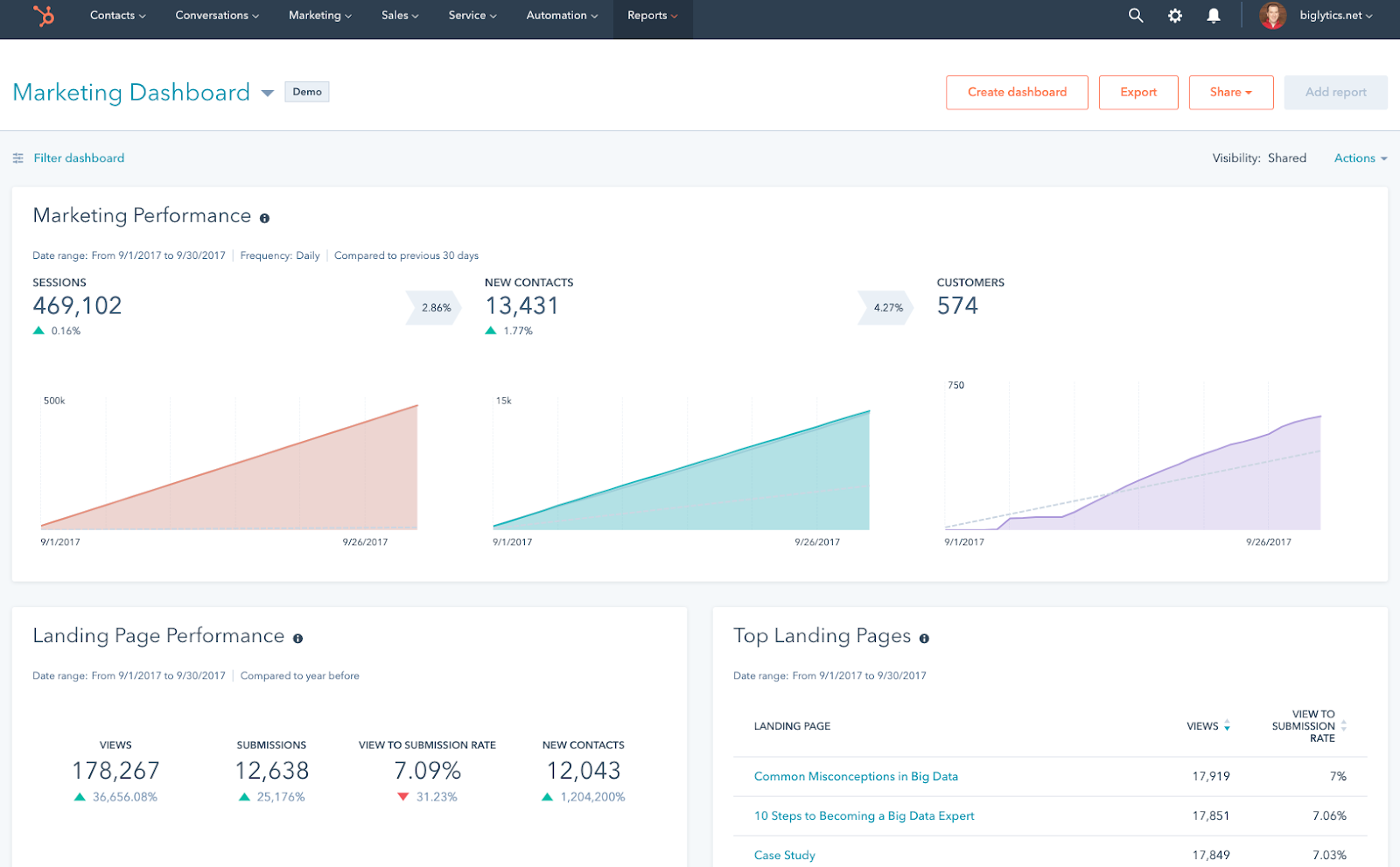
I have to admit, I’m a little biased here, but as a HubSpot Partner Agency, it’s easy to see why we put HubSpot on the list. HubSpot is a multi-platform software solution that is designed to align your marketing, sales, and service needs with one system.
Founder of the inbound marketing methodology, HubSpot is a great fit for marketers looking to use its built-in content marketing tools to attract high-quality website visitors and convert/nurture those leads into qualified sales opportunities. The platform’s key strength is allowing you to track and leverage multiple touchpoints at every stage of the buyer journey to create contextualized marketing experience.
From blogging to calls-to-action, forms, and landing pages, it puts all the tools you need from stranger to sale in one place.
HubSpot helps marketers ensure that their sales funnels are constantly supplied with high-quality sales-qualified leads (SQLs).
Once a lead converts to an opportunity (and eventually a customer), HubSpot provides additional, fully-integrated SaaS software solutions to help your sales and customer success teams continue to manage (and automate!) the customer journey. Some key features include:
- Deal pipelines
- 1:1 Sales email sequences
- Customer service ticket pipelines
- NPS surveys
While HubSpot is a great solution for growing businesses, it’s certainly not the cheapest option on the list. Like many SaaS softwares, HubSpot has a freemium starting point, but to fully access all of the fun automation tools, you’ll need to upgrade to a professional or enterprise tier (which starts at $800 per month.)
Related Articles:
- What is HubSpot and what the heck does it do, anyway?
- The Ultimate List of HubSpot Pros & Cons
- HubSpot alternatives: How it stands against 8 of its biggest competitors
- HubSpot pricing: Your guide to everything HubSpot costs for 2020
2. Marketo
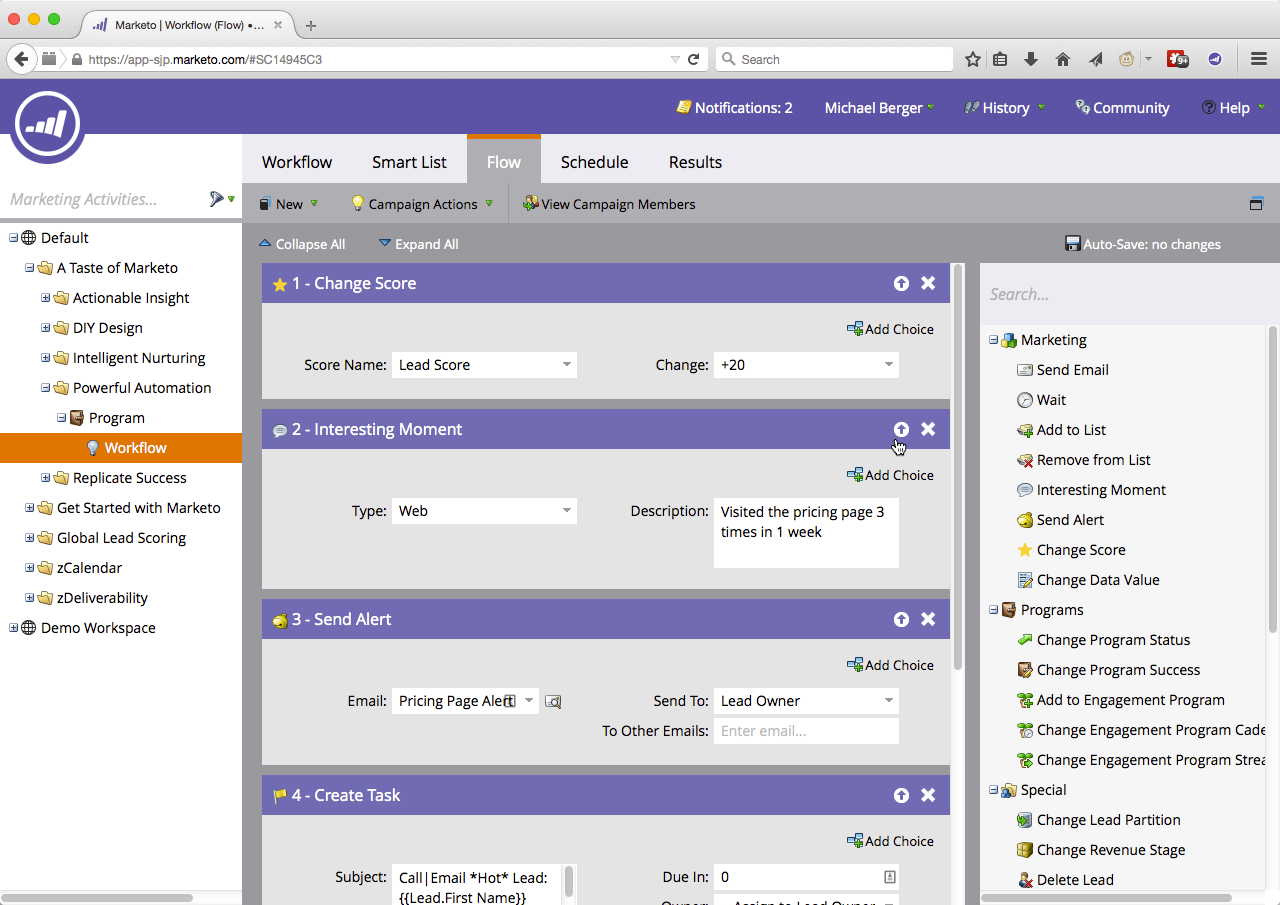
Purchased by Adobe in 2018, Marketo is a marketing automation solution focused on creating a personalized marketing experience.
By leveraging customer data, content, automation, and analytics, Marketo’s suite of marketing automation tools allow you to create a seamless customer journey that’s designed to be perfectly contextualized at every stage (from initial visitor to satisfied customer.)
Marketo positions itself as an enterprise-grade solution that focuses on scalability for large organizations. Which is great... if you’re a large organization that can afford enterprise-grade marketing automation software.
Since Marketo fails to list pricing information on its website, it’s hard to know just how expensive that marketing automation investment will be for your organization.
Beyond the cost considerations, Marketo may not be the best fit for growing SMBs that are looking to quickly get up to speed on a new platform. It gets lower than average marks for ease of use and ease of set-up, so expect a serious investment (both in terms of cost and the time and energy required to get up and running.)
Related Articles:
- HubSpot vs. Marketo: a Head-to-Head Comparison
- HubSpot alternatives: How it stands against 8 of its biggest competitors
3. Keap (formerly known as Infusionsoft)
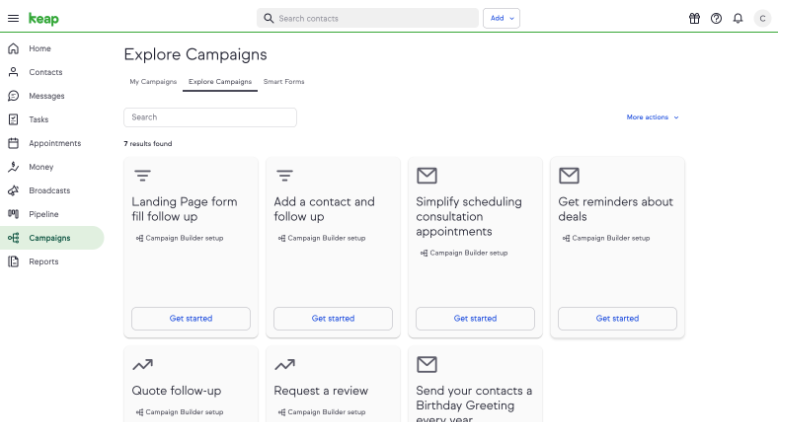
Keap positions its software as a “CRM and sales and marketing tool” that allows you to save time and energy by organizing customer information and streamlining work all within one software solution.
Similar to many of the entries you'll find on this list, Keap calls itself an “all-in-one” solution, and has a clear focus on the needs of the SMB target market.
But what does “all-in-one” really mean, and what do you sacrifice for the sake of keeping everything in one place?
While Keap is one of the more affordable options to help small businesses organize their marketing efforts (pricing starts at just $79 per month), it lacks some key features (content management system, keyword research, and built-in SEO capability) that may hold back certain organizations as they strive to scale up their marketing efforts.
Related Articles:
- Infusionsoft vs. HubSpot: Which is the Best Marketing Automation Software?
- HubSpot alternatives: How it stands against 8 of its biggest competitors
4. Pardot (by Salesforce)
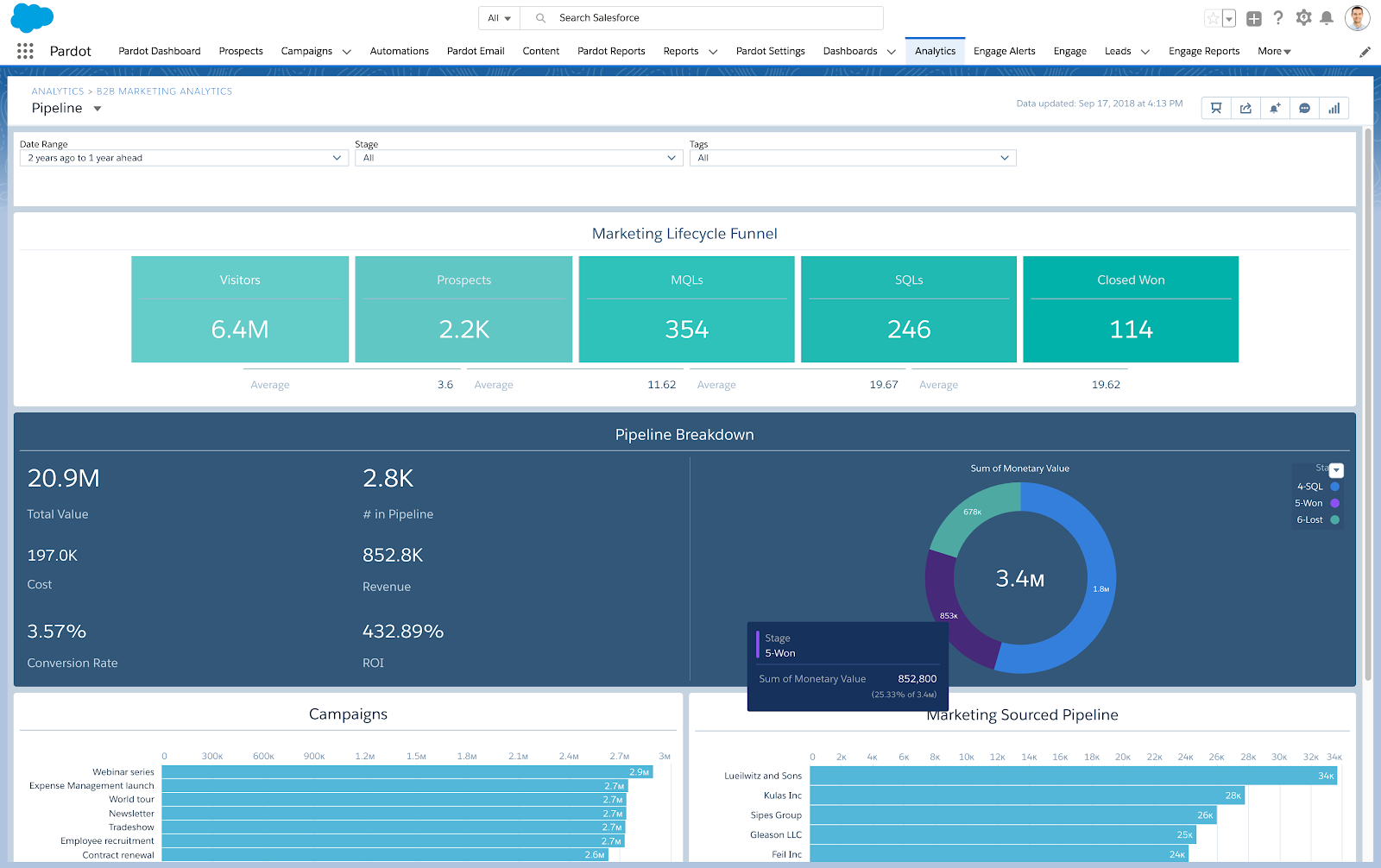
Pardot is a robust marketing automation platform that claims to fame is that it’s built on the world’s #1 CRM (also known as Salesforce.)
Much like its parent company, Pardot is an enterprise-grade solution with a powerful analytics-driven approach to marketing automation, which means it’s ideal for the B2B marketer that’s focused on using a vast database of customer data to create multi-touch marketing campaigns.
If you’re already a SalesForce user, adding Pardot can seem like a no-brainer, but for the non-SalesForce initiated out there, Pardot requires a serious investment in terms of time, energy, and cost.
The software set-up (and the $1,200/mo starting price tag) is not for the faint of heart, so growth-driven SMB marketers should think carefully about what they’re looking to accomplish before diving into such a complex marketing automation machine.
Related Articles:
- HubSpot CRM vs Salesforce: Which one is better?
- HubSpot alternatives: How it stands against 8 of its biggest competitors
5. Mailchimp
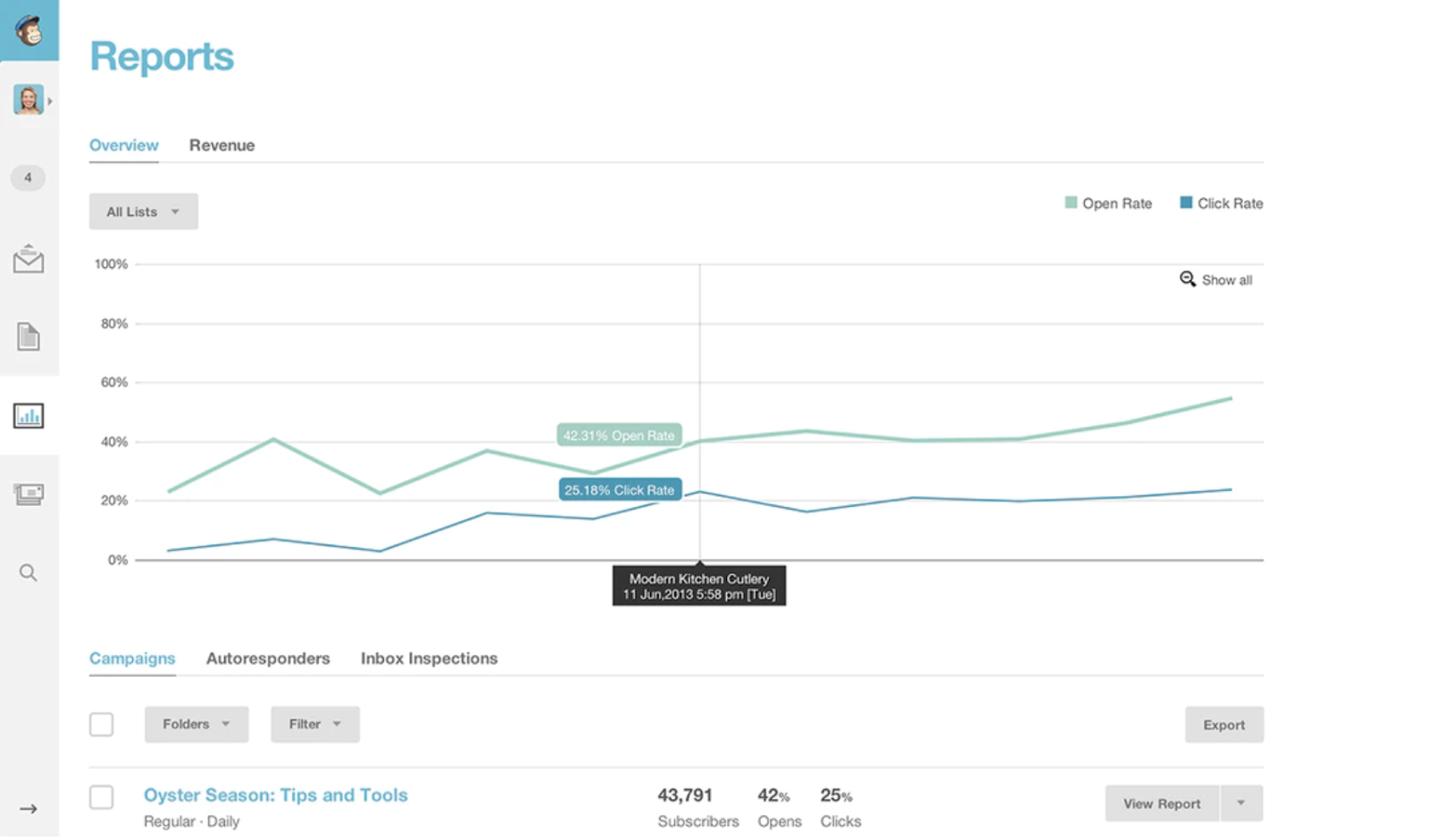
Mailchimp, which started out as a beloved email marketing platform, has grown into a beloved “all-in-one” marketing automation solution.
However, it recently expanded beyond its core mass email functionality and claims to have all the bells and whistles of a high-end enterprise-grade solution, but with a user-friendly interface that any SMB can easily adopt. Some new marketing features include:
- Mobile landing pages
- Pop-up forms
- Customer journey builder (aka automated workflows)
- Customer surveys
For all of its name recognition, Mailchimp is still the “new kid on the block” when it comes to marketing automation. While some features are readily available, others (specifically for cross-department collaboration between marketing and sales) just aren’t there yet.
So growth-driven SMBs need to be mindful that they may be comfortable now but need to look for a more robust solution later.
Related Articles:
- HubSpot vs Mailchimp for marketing automation: Which is better?
- HubSpot Email Marketing vs Mailchimp: Which Is Better?
- HubSpot alternatives: How it stands against 8 of its biggest competitors
6. Engagebay
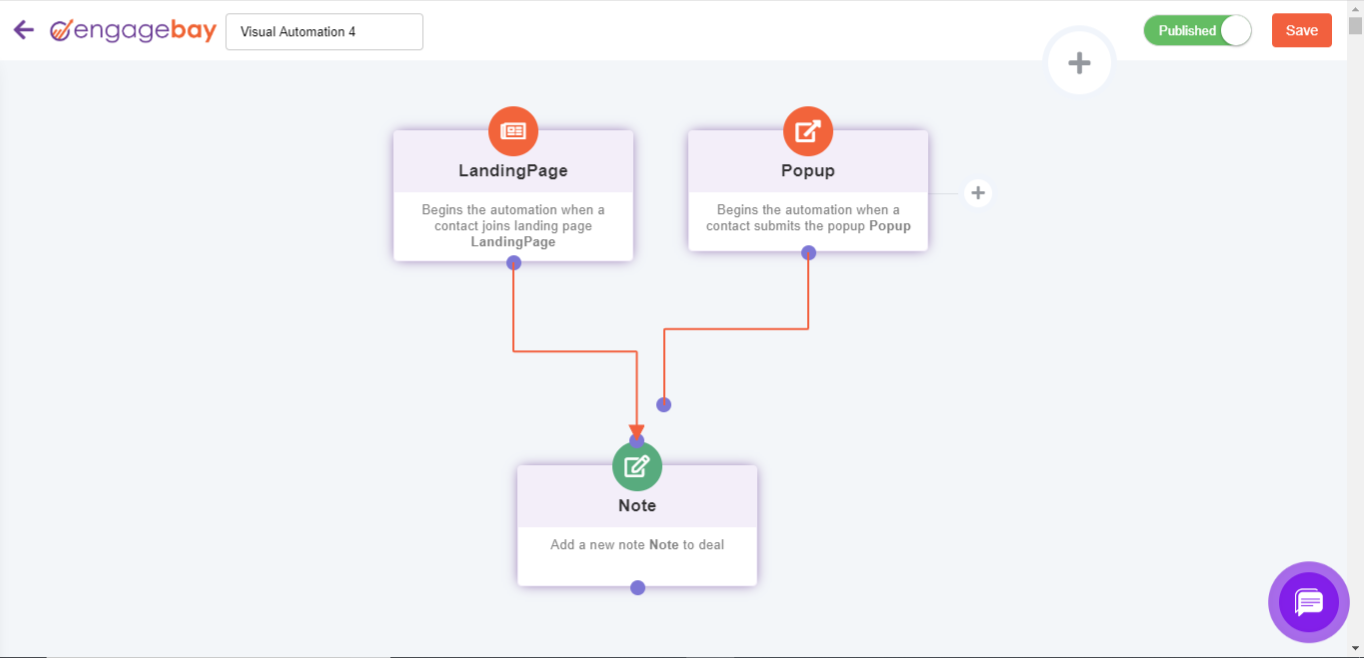
A relatively new player on the scene, Engagebay strives to be the “all-in-one” marketing automation solution for startups and small businesses. It does a little bit of everything, including landing pages, forms, lead segmentation, automated email responses, and even a built-in CRM.
However, where Egagebay really shines is its pricing. You can get a professional-grade seat with all of the bells, whistles, and add-on features for only $47.99 per user, per month (a fraction of the coast of some of the big players on this list.)
However, what you save in upfront cost will eventually be paid back in time, bandwidth, and energy if and when you ultimately need to upgrade to a more-enterprise grade solution.
Inexpensive, all-in-one solutions are a great fit to solve for the immediate needs of your small team, but what happens when you’re no longer a startup?
Growth-driven organizations need to look to the future to ensure that the marketing automation platform they select can scale with them over time.
7. Oracle Eloqua
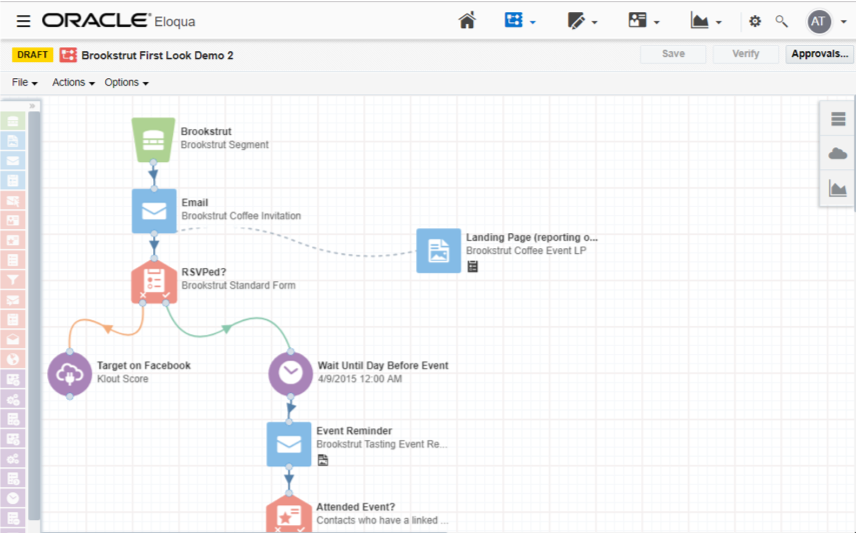
Built into the Oracle Cloud Infrastructure, Oracle Eloqua is another enterprise-grade solution for B2Bs looking to make a serious investment in their marketing automation. Some key features include:
- Segmented lead nurturing
- Dynamic email content
- A/B testing
- Lead scoring
If your organization is already utilizing Oracle for other business needs, Eloqua may be a natural fit. It can seamlessly integrate with other Oracle Fusion Cloud applications to leverage multiple sources of data and provide a powerful user experience.
However, if you’re not on the Oracle bandwagon, Oracle Eloqua is an expensive solution that rates far below average for ease of use and ease of setup. If you have no intention of investing in the full Oracle suite of products, this application might not be the best fit for your organization.
Related Articles:
8. Demandforce
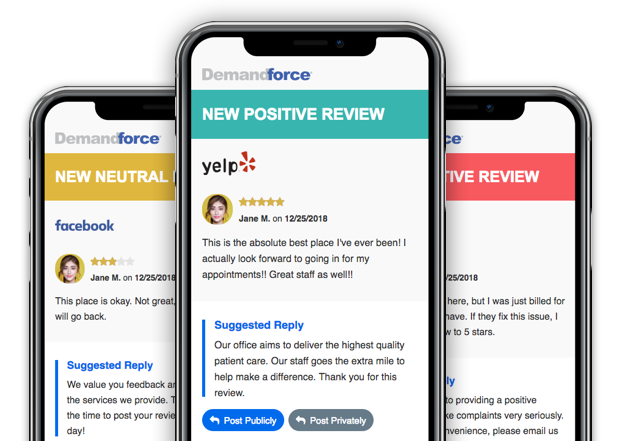
Demandforce is a marketing automation solution that focuses on robust reputation management. It’s a perfect fit for service-related and local businesses that need to streamline customer communications and ensure that their online reputation is nothing short of five-stars.
Features include:
- automated appointment booking (with built-in confirmations and reminders)
- call tracking
- mass email marketing
- two-way text messaging
However, Demadforce does not cater to businesses looking to host their website or publish content.
Related Articles:
9. Act-On
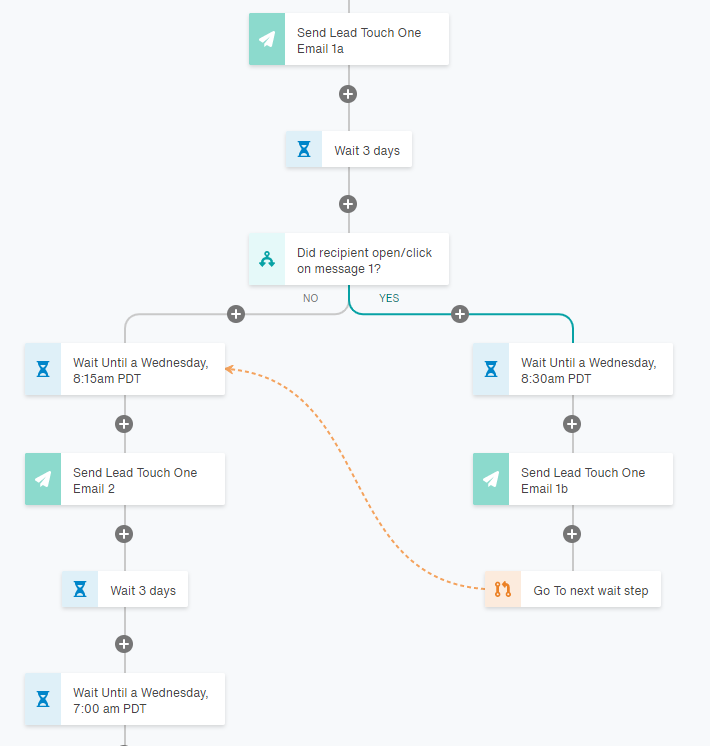
Act-On prides itself on being a “growth marketing platform,” which means it's a perfect fit for this list.
With a robust set of marketing automation features, decent analytics and reporting, and a pricing structure that fits the needs of growth-driven organizations, Act-on should be on everyone’s shortlist. Here are just a few of the great features you can expect:
- Landing pages and forms
- Online behavior tracking and web analytics
- Mass email marketing
- Lead scoring
However, there are two major drawbacks to consider before you purchase Act-on. The first is that they claim world-class customer service and support (but they’ll charge you an extra fee in order to have access to it.)
The second is that the software has no built-in CRM functionality. So while the $900/mo starting price is pretty reasonable for the amount of marketing automation features included in that tier, you will need to factor in the extra cost of purchasing and integrating a secondary CRM system into your marketing tech stack.
Related Articles:
10. Zoho Campaigns
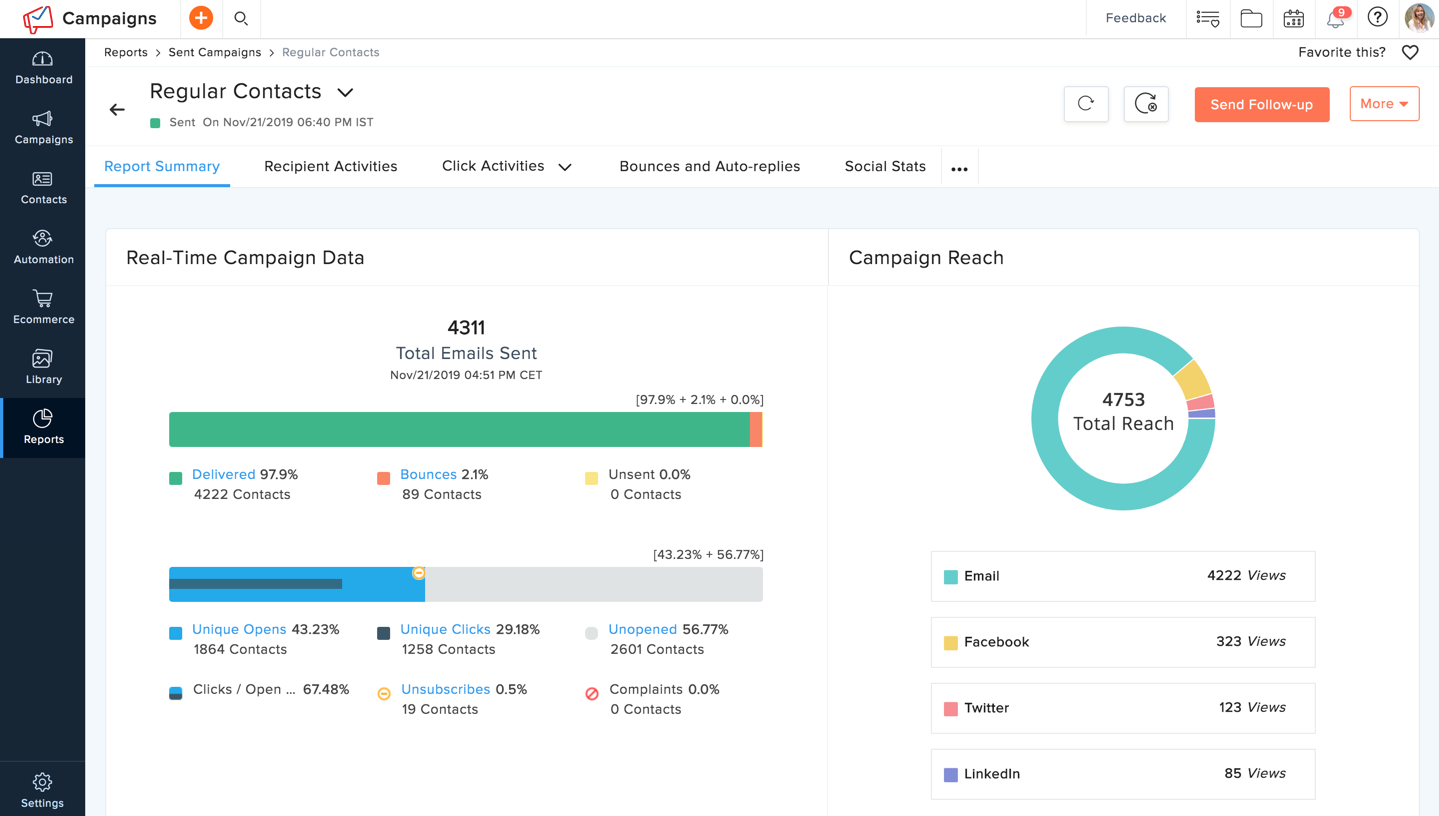
Zoho Campaigns is a powerful marketing automation software that lives in the Zoho CRM platform. This application excels at email marketing efforts, including features like a drag-and-drop email editor, A/B content testing, advanced segmentation, and personalization.
Higher-level features (such as onboarding, lead-nurturing, or customer-engagement automation) also allow you to construct automated workflows and introduce dynamic content.
Zoho’s pricing structure (starting at just $2 per month) is also unique because you only pay for the number of emails you send and the number of subscribers on your email marketing lists.
However (as we’ve seen with other entries on this list), Zoho Campaigns makes the most sense for customers who are already using other software solutions on the Zoho CRM Platform. Zoho Campaigns lacks key functionality as a stand-alone SaaS solution, so if you’re unwilling to fully commit to Zoho as your CRM provider, you should keep your options open.
Related Articles:
11. SharpSpring
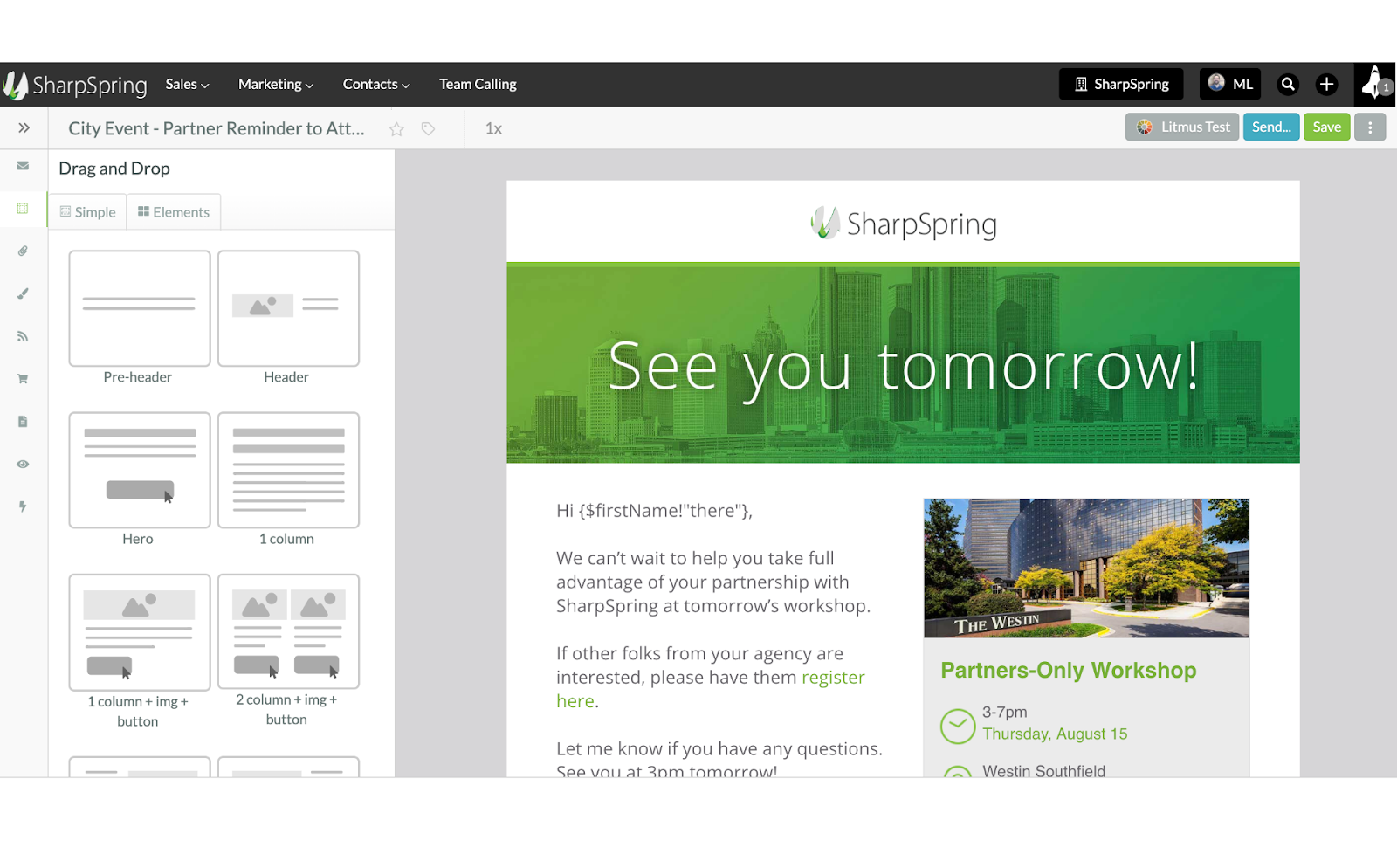
At its core, SharpSpring is an email marketing platform with additional marketing automation elements designed to help your business send the right message, at the right time, to capture the hearts and minds of potential customers.
Beyond the core email marketing functionality, SharpSpring offers landing pages, lead conversion forms, and workflow capabilities.
While SharpSpring works for SMBs and offers some custom enterprise solutions, they’re heavily focused on targeting marketing agencies to use SharpSpring on behalf of their clients.
If you’re not a growth-driven marketing agency, there are probably better software solutions on this list that would better suit your needs, but if you are an agency looking for an email marketing solution, SharpSpring may be the perfect platform for you.
Related Articles:
12. ActiveCampaign
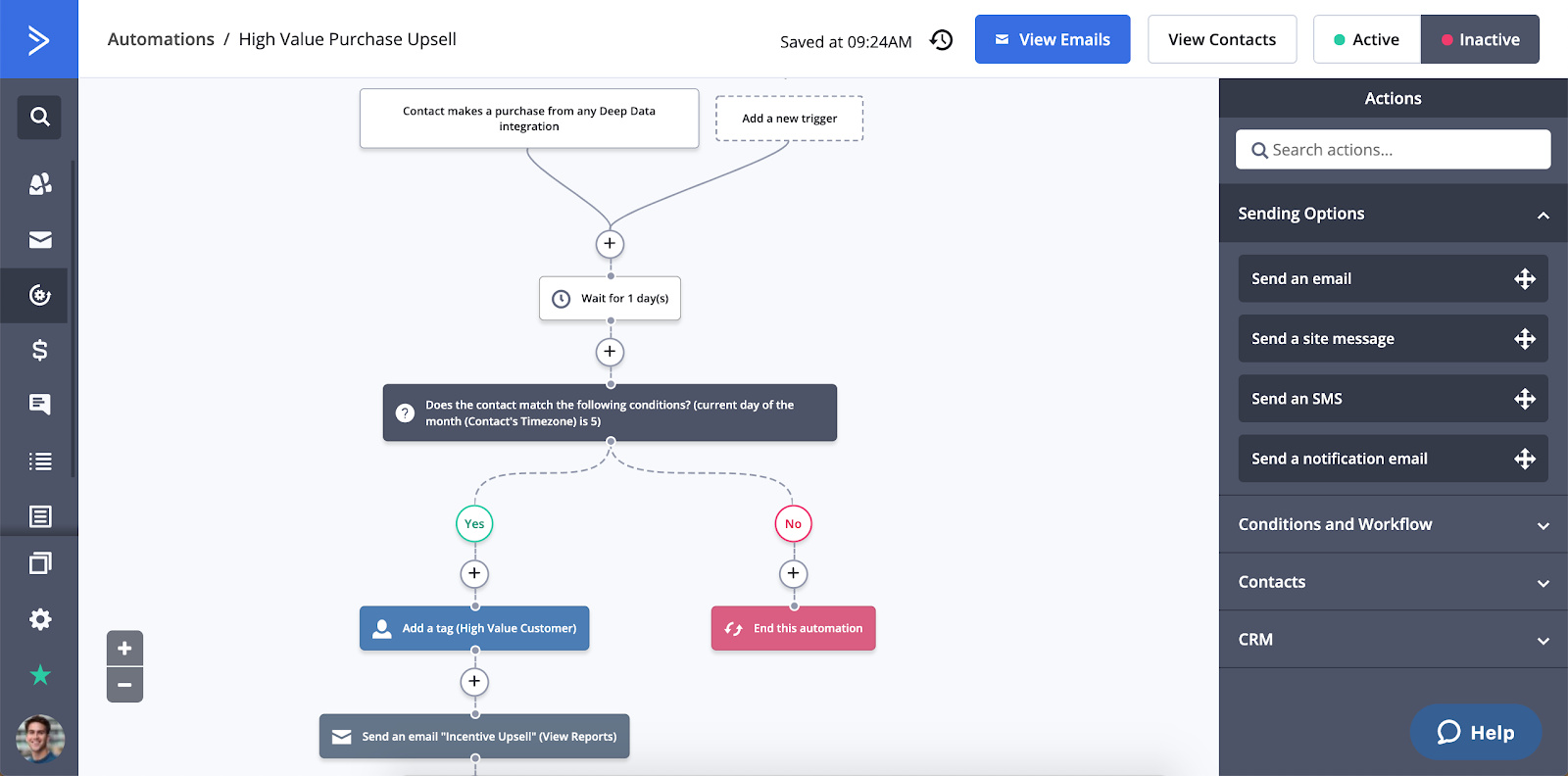
ActiveCampaign claims to be the #1 “Customer Experience Automation (CXA) Platform,” but what does that actually mean?
(I wasn’t sure either, which is why I dove in to decode the buzzwords and figure it out!)
Unlike other marketing automation platforms, ActiveCampaign allows users to access hundreds of pre-built automation tools that combine multiple marketing touchpoints across multiple platforms (think of them as pre-built recipes for success.)
For example, when you integrate with Shopify, you can instantly deploy a workflow to nurture abandoned carts and ensure that no purchases get left behind.
ActiveCampaign also heavily leverages integration partners (such as Shopify, Facebook, Eventbrite, WordPress, and Salesforce) to integrate data from multiple sources into one system.
By using buzzy phrases like “Customer Experience Automation (CXA) Platform,” ActiveCampaign tries to position itself as the disrupter of traditional marketing automation software solutions — but their follow-through is slightly less than convincing.
While the tool does offer a unique emphasis on helping businesses manage their 1-to-1 customer relationship at scale, the truth is that almost every marketing automation software on this list delivers on that same promise.
They have an attractive pricing model (starting as low as $9 per month) to help growth-focused organizations get started, but, keep in mind, their pricing structure is partially based on the number of contacts you store in the CRM (which is very similar to HubSpot), so it can get pricey as your database grows over time.
13. GetResponse
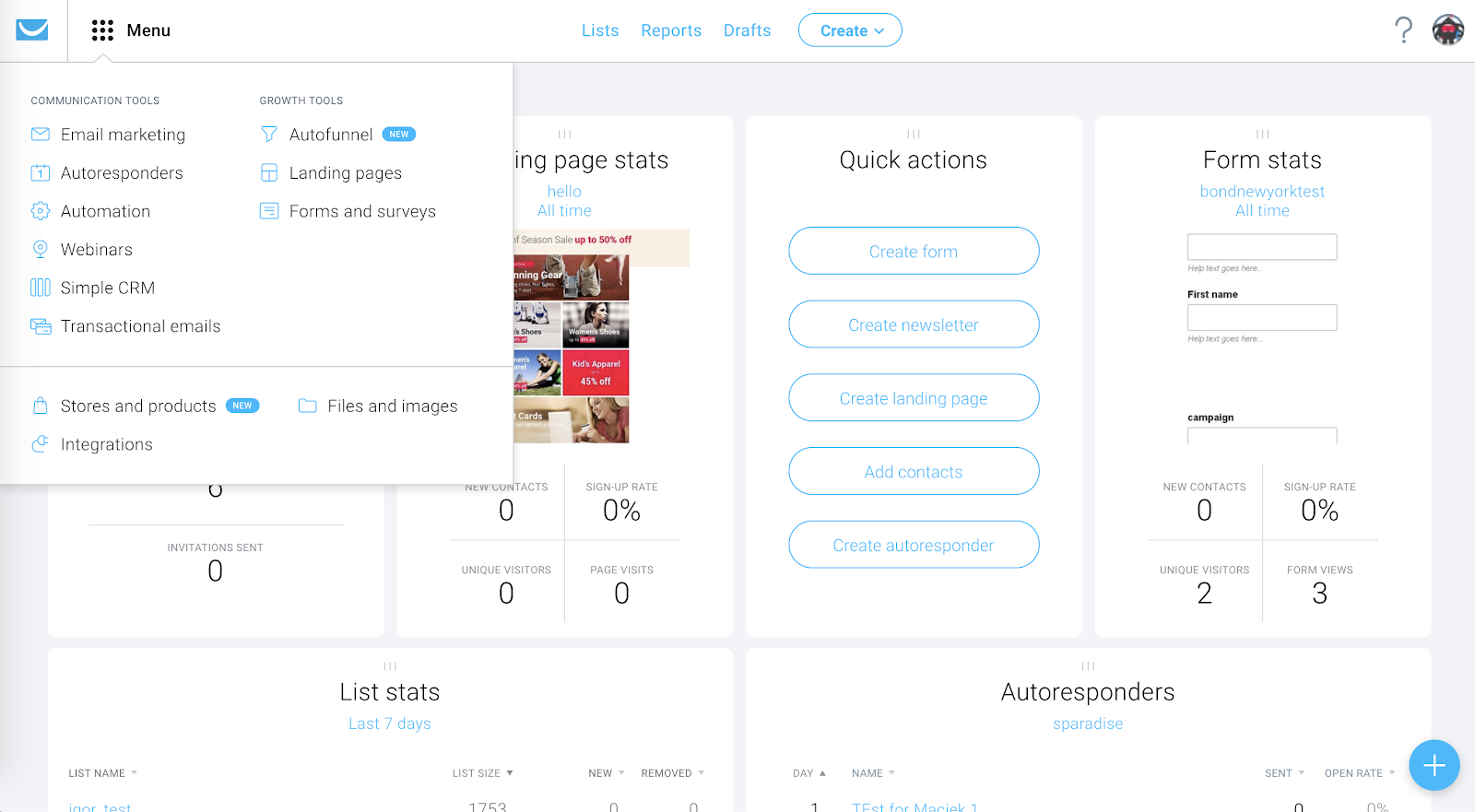
GetResponse is probably the most “middle of the road” marketing automation software on this list.
The software’s feature set is mainly focused on lead attraction and conversion via personalized email marketing, landing pages, and forms. There are some bells and whistles (i.e. A/B testing, basic lead scoring, and dynamic content), but nothing too wild or crazy.
It’s not the cheapest option in this roundup (starting at $15/mo), but also certainly not the most expensive. It’s also pretty average in terms of ease of use and ease of setup.
Overall, it’s a fine marketing automation software if you’re looking for an inexpensive introductory model that can give you a bit more than basics, but if you’re a growth-driven company looking for long term viability, you can get a lot more bang for your buck with other comparable options on this list.
14. Autopilot
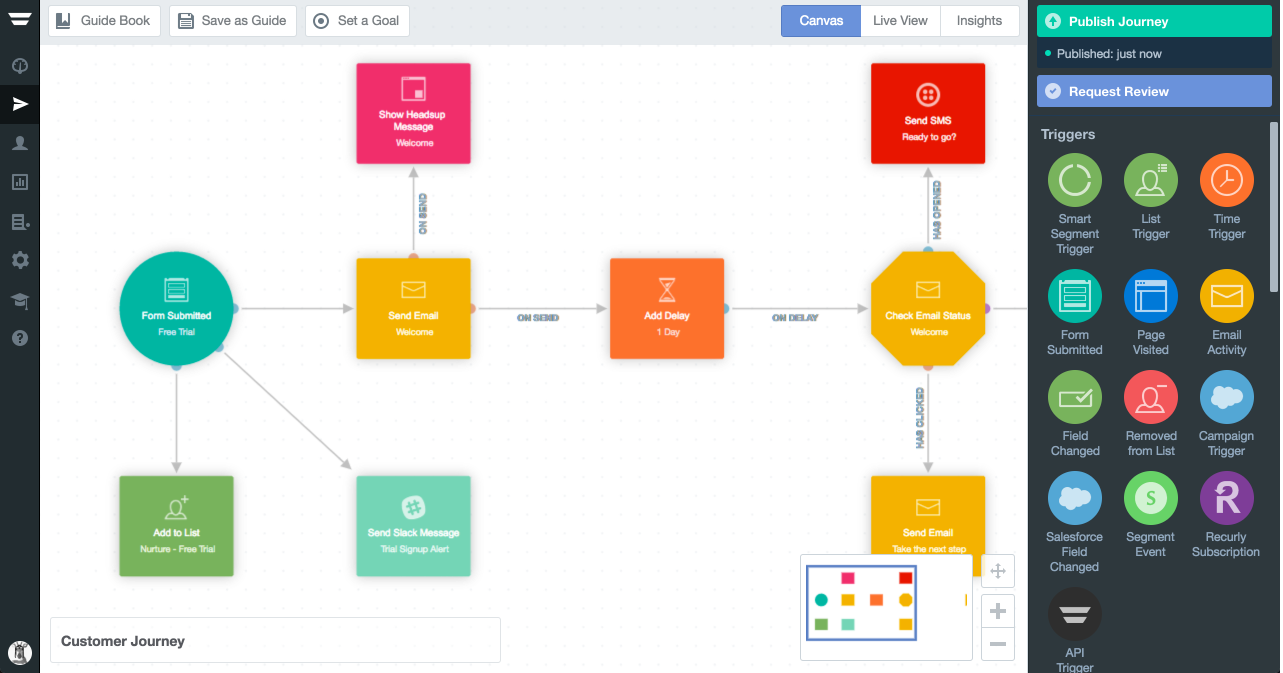
Autopilot fully embraces the work style of modern marketers. They know that (deep down) we’re all visual learners who want to easily get up and running on a new marketing automation software (without getting bogged down in a complex rollout.)
That’s why Autopilot is “marketing automation software made visual.” The software solution boasts a “visual canvas” that allows you to create automated customer journeys using colors codes and a variety of shapes.
Is this vastly different than other automated workflow editing bays? No, not really. It’s clear that this team is focused on providing marketers with a clean and simplified user experience. But the real question you should be asking yourself is: what do you sacrifice for the sake of a simple UX?
Reporting and analytics are definitely lacking when compared to the enterprise-grade engines on this list. You’ll see simple (fully visualized) trends, but you might lack the granularity of other marketing automation tools.
Similar to ActiveCampaign, Autopilot also provides a library of templates for marketing automation, which helps you get quickly up to speed when launching your new marketing automation software.
Ultimately, this tool is geared towards the marketing focused creative who wants software that’s super easy to navigate. If you want a powerful analytics machine, you’ll probably want to check out other alternatives.
15. Klaviyo
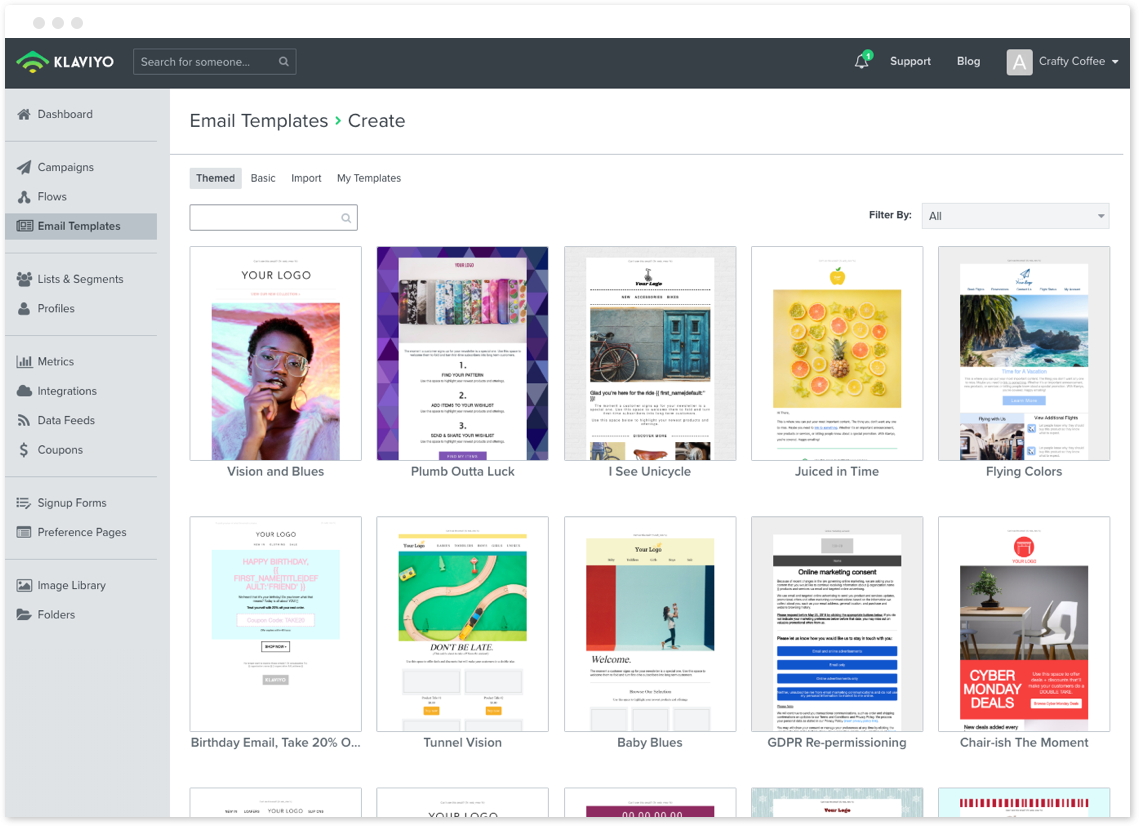
Last, but not least, Klaviyo is another low-cost provider that offers straightforward email options for price-conscious buyers, but also SMS marketing.
An SMS strategy can be ideal for marketers whose customers are constantly on the go. Plus, text message marketing offers higher open rates and higher response rates compared to traditional email marketing efforts these days.
Klaviyo’s pricing model is simple: no annual contracts, no hidden fees, and your monthly rate is calculated based on the number of contacts in your database, but, their marketing automation features mainly focus on list segmentation and personalized outreach for email and text messaging.
If you’re looking to reach out to a large database of customers on a tight budget, Klaviyo might be a great fit for your needs. But if you’re looking to expand beyond basic blast emails and text messages, you’ll need to evaluate other marketing automation software options.
The bottom line
There’s no way to compile a definitive list of the “best” marketing automation solutions. The truth is that there are hundreds of options, and each solution is uniquely designed to fit a specific marketer with specific needs.
Choosing the right software is never an easy task (and successfully implementing that software can be even harder), but you can set your team up for success by asking a few key questions:
- Will this software be easy to implement, and easy to learn?
- Will this solution save my team time and energy when completing day-to-day tasks?
- Will this marketing automation allow me to send the right message, at the right time, to further engage my leads?
- Will this solution drive traffic, leads, and sales for my organization?
- Will this marketing automation software positively impact my marketing efforts enough to justify the cost?
While there’s no way to guarantee success, with the right due diligence (and an organization attitude that’s willing to embrace change), you can select the best marketing automation solution to help your business achieve its growth-driven goals.


Order Your Copy of Marcus Sheridan's New Book — Endless Customers!